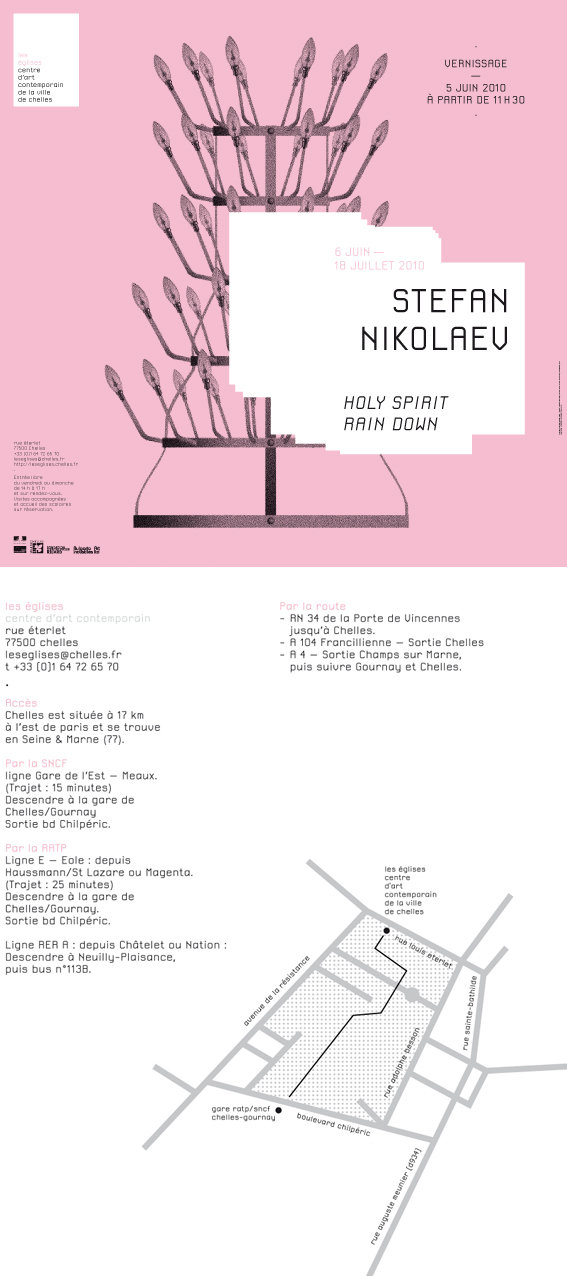Stefan Nikolaev
dal 4/6/2010 al 17/7/2010
Segnalato da
4/6/2010
Stefan Nikolaev
Les eglises - Centre d'art contemporain, Chelles
Holy Spirit Rain Down. Nikolaev's sculptures often offer the spectacular presence of monumental religious by-products, marrying industrial design with the luxury of handmade gold and silver work, idolatrous formalism with Pop icons, and commercial promotion with metaphysical disillusionment. Curated by Eric Degoutte.

curated by Eric Degoutte
Art is like a bar kept open in the midst of ruins. At a time when human beliefs are verging on bankruptcy, visitors who have sobered up may still find the wherewithal therein to quench their thirst for hypotheses and their interest in a shared geometry. The bar serves on tap everything that may one day have led to both an elation of the senses and a knowledge of the mysteries of things living. It is bar with no VIP nook; nor does it select its customers. For this reason, of course, it attracts few people—like old chur¬ches—far fewer, in any event, than night clubs. The crowd thinks it knows, right away, that it will barely meet more than the "dull gaze of the plaster of statues", as the poet put it, and that it will not inhale the aromas of trance-inspired meat.
As ever, the crowd is wrong. Stefan Nikolaev is one of those artists still young enough (he was born in 1970) to hang out in night clubs and believe at the same time in art as something that abstracts competitive atmos¬pheres, merging paroxysm and pith aimed at caustic and nevertheless tempered consumption. His sculptures, with their finish befitting flawless knick-knacks, often offer the spectacular presence of monumental religious by-products, marrying industrial design with the luxury of handmade gold and silver work, idolatrous formalism with Pop icons, and commercial promotion with metaphysical disillusionment. His huge packets of cigarettes spring to mind, made of marble and engraved with gold, conjuring up, through their very size, kinds of advertising gravestones, brutally lending substance to the warning message printed in all cigarette packs. Or, more recently, his replica on the scale of an ATM galvanized with 24-carat gold, turning the cold cash-vending machine i nto a seductive medium of extravagance, a disturbing decoy for dazzled onlookers who are thus only able to remove the reflection of their eternally suspended and hor(au)rified greed…
What can an artist give better—to borrow Lacan's famous definition of the person in love—than what he does not have, and to people who do not want it? For his show at the Chelles art centre, Stefan Nikolaev seems to have come up with the idea of giving us still more—supreme love? faith in art? The place definitely lends itself well to this: two adjoining old churches forming just a single nave through the action of cultural and patrimonial cement (and the intelligence of the designer Martin Szekely). In the first, the artist has made strange lights which turn the hackneyed motif of Duchamp's bottlerack into candelabras in a "pop-clerical" style, if we may so put it. In the second, he has filled the empty space of the Gothic windows with more than a thousand full bottles of alcohol, of different hues and without labels, which, set on imperceptible shelves, filter the sun light just like multicoloured stained-glass windows.
Is this remarkable iconoclastic master-glazier's prowess the mystical enlightenment of a boozer? Is it a tribute to the readymade as a perfect intercessor of vision in our belief in art? Or alternatively, running counter to this first-communion-like mode which is at once profane and well-behaved, must every visitor jiggle his solitary shaker with the flavor of his imagined cocktail? And then must everything be drunk to believe it? Spiritually and spiritedly, or what?... is this not once more the immortal lesson of maestro Rabelais, the brilliant "abstractor of quint essence" that is being re-enacted here? Having reached the end of his initiation, and finally drinking at the fountain of the Dive Bouteille, everyone finds the wine-flavoured water they imagine, and when they switch imaginations, the water changes taste. "O heart, you will never pierce the mystery,/ Never will you illuminate the subtleties of the philosophers. /Make yourself a heaven of wine and a goblet, / For do you know if you will ever make your way into the real Heaven?" (Omar Khayyam)
Vincent Labaume
Translated from the French by Simon Pleasance
Press & public relations
Faustine Douching t +33 (0)1 64 72 65 70 mail f.douchin@chelles.fr
Opening 5 June 2010, from 11.30 am
Les Eglises - Centre d'art contemporain
rue Eterlet, Chelles, France
Hours: friday, saturday, sunday 2 pm - 5 pm and appointment
free admission



